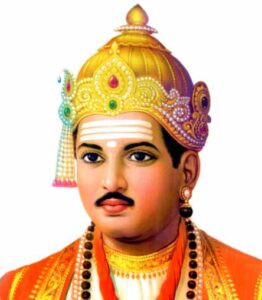GS 1 – HISTORY

Context:
The Vachana Mantapa project was launched in Kalaburagi during Basava Jayanti in 2025.
Biography:
Basaveshwara, also referred to as Bhakti Bhandari (treasurer of devotion), was an Indian philosopher, poet, and social reformer.
- Birth and Early Life: He was born in 1131 AD in Bagevadi, now part of Karnataka.
- Public Service: He served as Karanika (Accountant) and later as Prime Minister under Kalachuri king Bijjala at Kalyana.
- Social Reforms: Basaveshwara opposed caste discrimination and gender bias, initiating reforms that ensured dignity for all.
- Founder of Lingayatism: He established the philosophical and doctrinal basis for Lingayatism, a socio-religious system focused on ethical living. His followers, called Virashaivas (heroes of Shiva), rejected ritual and idol worship and challenged the concept of rebirth. The movement also advocated practices such as post-puberty marriage and widow remarriage, which were disapproved of by Brahmanical traditions.
- Lingayat Worship: Lingayats worship Shiva in the form of a linga, often worn by men as a symbol of devotion. The movement promotes the idea that upon death, devotees unite with Shiva and are not reborn, rejecting traditional funeral rites like cremation. Instead, the deceased are ceremoniously buried.
- Death: He is believed to have achieved spiritual samadhi in Kudalasangama, now in Bagalkot district.
Contributions:
- Lingangayoga (Spiritual Framework): A holistic spiritual discipline based on true knowledge (Arivu), right conduct (Achara), and divine experience (Anubhava), combining devotion (Bhakti), knowledge (Jnana), and righteous action (Kriye) to achieve spiritual union with the divine.
- Ishta Linga Worship: Encouraged spiritual equality through personal worship, allowing everyone, even those without Ishta Linga, to partake in the practice.
- Democratization of Religion: Basaveshwara eliminated priestly intermediaries, making spiritual pursuit a personal, direct experience.
- Opposition to Ritualism: He resisted elaborate rituals and animal sacrifices, promoting inner purity and ethical living instead.
- Kalyana Rajya (Welfare State): He advocated for equal rights and responsibilities for all, irrespective of caste, class, or gender.
- Anubhava Mantapa: He established the first socio-spiritual Parliament in Kalyana, a platform where Sharanas (enlightened seekers) from all castes could openly discuss democratic, spiritual, and social values.
- Kayaka (Divine Work): Emphasized work as worship, advocating for dignity in all occupations, regardless of caste.
- Dasoha (Equal Distribution): Promoted economic equity by encouraging the sharing of surplus wealth with the poor and society.
- Promotion of Rationalism and Humanism: Basaveshwara championed questioning blind faith and emphasized compassion, reason, and human dignity as core spiritual values.
- Support for Inter-Caste Harmony and Women’s Empowerment: He supported inter-caste marriages and the empowerment of women, exemplified by his advocacy for women like Akka Mahadevi and other female Sharanas.
- Vachana Literature: He pioneered a revolutionary literary movement, composing Vachanas in simple Kannada. These poetic expressions were reformist and addressed both social and spiritual issues.
Legacy:
- Beyond Lingayatism: Basaveshwara’s ideas inspired social reformers and movements across Karnataka, influencing the Buddha-Basava-Ambedkar ideology.
- Global Recognition: His principles of equality, non-discrimination, and work-based dignity have gained international acknowledgment. A statue of Basaveshwara stands in London, symbolizing universal human values.
- Hagiography: The life and teachings of Basaveshwara are chronicled in the 13th-century sacred Telugu text, Basava Purana, by Palkuriki Somanatha.




